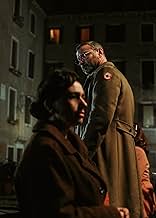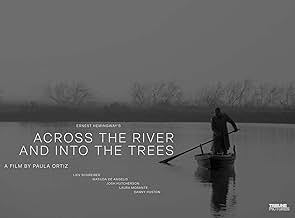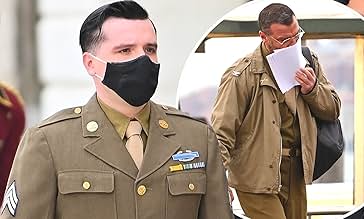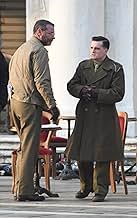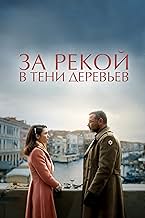Im Venedig Italiens nach dem Zweiten Weltkrieg ist der vom Krieg gezeichnete Oberst der amerikanischen Armee Richard Cantwell ein echter Held, der die Nachricht von seiner Krankheit mit stoi... Alles lesenIm Venedig Italiens nach dem Zweiten Weltkrieg ist der vom Krieg gezeichnete Oberst der amerikanischen Armee Richard Cantwell ein echter Held, der die Nachricht von seiner Krankheit mit stoischer Gleichgültigkeit hinnimmt.Im Venedig Italiens nach dem Zweiten Weltkrieg ist der vom Krieg gezeichnete Oberst der amerikanischen Armee Richard Cantwell ein echter Held, der die Nachricht von seiner Krankheit mit stoischer Gleichgültigkeit hinnimmt.
- Regie
- Drehbuch
- Hauptbesetzung
Empfohlene Bewertungen
This film is actually quite great. A beautiful Hemingway novel nicely translated here. It's a rich and beautiful film, but unlike most Hollywood films that attempt to aim for similar results. Thanks mostly to the original writer, this one is also very true to life, it's very down to earth. You can really feel the humanity and the characters in this film. The acting and direction are also mostly very strong. This is a story that has been in the works to be a film many times. Finally it's here, and it really is a rewarding result. This was entirely worth seeing on the big screen, as the Venice setting and the cinematography are stunning throughout much of the film.
8/10.
8/10.
Extremely hard to discuss this without spoilers, but here we go.
I never read or even heard of this book, though I did enjoy a few other from Hemingway. So, I did not know the ending but I did guess it. It is a mess.
I've never been to Venice and I can think of a bunch of places in teh world I'd rather visit for the first and even the second time that have a more natural beauty. Still, Venice is a great location for a film, both day and night, especially the night shots lit beautifully by professionals.
On the other hand, this story is a mess, Some of the comments i read about the themes and the relationship make me think people were watching a different movie. The plot is a CHIMERA, truly disjointed,
I never read or even heard of this book, though I did enjoy a few other from Hemingway. So, I did not know the ending but I did guess it. It is a mess.
I've never been to Venice and I can think of a bunch of places in teh world I'd rather visit for the first and even the second time that have a more natural beauty. Still, Venice is a great location for a film, both day and night, especially the night shots lit beautifully by professionals.
On the other hand, this story is a mess, Some of the comments i read about the themes and the relationship make me think people were watching a different movie. The plot is a CHIMERA, truly disjointed,
There are several stars of this film. While Hemmingway's source novel was pretty universally panned, the screenplay, cinematography, and fine acting and casting in this film set it apart as a long overdue adaptation of one of Hemingway's lesser known works. First the acting by Mr. Schreiber - it is outstanding, showing emotional trauma damage, an appreciation of the natural and artistic world, and the vulnerability of an old warrior dealing with his illness and mortality. The cinematography is a delight - flirting with color as well as black and white and a variety of aspect ratios, it adds a thoughtful overlay to the story. Love interest Renata is played with aplomb by a beautiful, young Italian actress named Matilda de Angelis. To capture the emptiness of postwar Venice, the COVID restrictions played a major part - providing empty waterways and a deserted St Marco Square for the action of the story to take place in. It was a beautifully produced film and well worth seeing for any fan of Hemingway's work or of Mr. Schreiber's fine acting abilities, which have never been showcased better.
Everything is beautiful in this movie. Venezia, of course, but also the actors, in particular Matilda De Angelis. The director manages to catch that beauty in every scene. The changes in aspect ratio is a very intelligent way to make as feel the difference between the dreams that he is living and the reality that lives in his head. The movie becomes a series of photos that you would like to print and frame. The rhythm is slow, because you need to take your time to taste each scene. Just as the protagonist stars at the "frescos", you're supposed to stare at each frame. In addition, the script is very good and the performances of both main actors are impeccable and natural. It's a joy for all the senses.
As death approaches, how should we handle it? Is it something to be feared? Something to which we're stoically and unemotionally resigned? Willingly embraced as the logical outcome of our corporeal existence? Or is something to be met with grace and measured acceptance, as expressed in the dying words of Confederate General Thomas "Stonewall" Jackson: "Let us cross over the river and rest under the shade of the trees," a sentiment reflected in the title of this film, an adaptation of the 1950 Ernest Hemingway novel of the same name. Director Paula Ortiz's screen version of this work tells the story of Col. Richard Cantwell (Liev Schreiber), a US Army officer serving in Italy during the waning days of World War II. The Colonel is dying from heart disease but faces his circumstances like the committed, consummate soldier that he is. He resists all efforts at treatment and instead chooses to visit Venice before embarking on a day of duck hunting. But, before carrying out this plan, his attention is diverted by an array of developments, including introspective reflections of his troubled wartime past (having served in both of the Great Wars), the beauty of the city of canals and the company of a young contessa (Matilda De Angelis) who's trapped in a loveless arranged engagement governed more by family financial considerations than genuine romance. These events give the Colonel pause to think about his life, his regrets, his loves, his missed opportunities and his future (or what there may be left of it). The result is a quiet, poetic and often profoundly sad tale characterized by a series of deep conversations that give him (and all of us) much to ponder. Unfortunately, though, the presentation of this material is at times in need of greater finesse and clarity, remedies to counter its tendencies toward becoming overly talky and somewhat unfocused. That's regrettable given the nature of the circumstances at hand in this narrative, with their treatment frequently resulting in more diluted muddle than insightful, forthright articulation. Sadly, this shortcoming also detracts from the positively superb performances of the two leads, who portray their characters with a heartfelt earnestness, depth and sincerity, along with a carefully calculated vulnerability. To its credit, the film's gorgeous production design and absolutely stunning cinematography (especially of lesser-known Venice locales) provide a genuine feast for the eyes, truly remarkable in virtually every passing frame. It's a shame, however, that the remainder of the film doesn't measure up to these other fine qualities. Perhaps that's attributable in part to the source material, which, despite commercial success at the time of its publication, was not as critically acclaimed as the author's other works. It seems that there's a meaningful message lurking somewhere in this material (and in this film) that just never quite surfaces to the degree that it needs to, given the thoughtful subject matter that it was trying to express.
Wusstest du schon
- WissenswertesFor years, this had been a dream project for several high-profile actors and directors. John Huston tried to set it up several times, and Burt Lancaster desperately wanted to play the aging military martinet. At one stage, Robert Altman almost got it made with Roy Scheider, Julie Christie and Greta Scacchi starring, but funding collapsed at the last moment.
- PatzerAs to the strict grooming regulations in the postwar U.S. Army, a Colonel of The Big Red One who was recognized as a hero among combat commanders would have been an officer who would have been viewed by any of his seniors as a soldier who would have been off limits for the application of such petty regulations as grooming when off duty.
Army politics being as they were in the immediate postwar period, particularly in the European regions it would have been career suicide for any officer under the rank of Major General to have treated a decorated combat commander so poorly as to reprimand him for failing to shave while he was on leave, in uniform or out. For that matter a Major General or Lieutenant General would only have noticed the Colonel's grooming had the Colonel attended an important function, or have gone before his commanding officer without a clean shave and fresh haircut, which Colonel Cantwell hasn't done at any time in this film.
Top-Auswahl
Melde dich zum Bewerten an und greife auf die Watchlist für personalisierte Empfehlungen zu.
Details
- Erscheinungsdatum
- Herkunftsland
- Sprache
- Auch bekannt als
- Al otro lado del río y entre los árboles
- Produktionsfirmen
- Weitere beteiligte Unternehmen bei IMDbPro anzeigen
Box Office
- Bruttoertrag in den USA und Kanada
- 147.582 $
- Eröffnungswochenende in den USA und in Kanada
- 67.318 $
- 1. Sept. 2024
- Weltweiter Bruttoertrag
- 216.024 $
- Laufzeit
- 1 Std. 46 Min.(106 min)
- Farbe
- Seitenverhältnis
- 1.37 : 1
Zu dieser Seite beitragen
Bearbeitung vorschlagen oder fehlenden Inhalt hinzufügen



